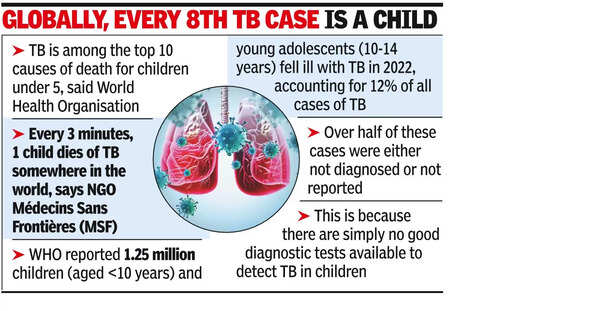- News
- City News
- mumbai News
- ICMR to fund smart mask project to detect TB in kids
Trending
ICMR to fund smart mask project to detect TB in kids

Mumbai: An innovative mask developed by city scientists to painlessly detect tuberculosis (TB) among children has bagged funding from the Indian Council of Medical Research (ICMR) to conduct a four-year-long study.
“Diagnosing pulmonary TB in children is a challenge because they don’t exhibit typical symptoms, have non-specific radiological features and difficulty in obtaining sputum samples,” said Dr Ambreen Shaikh from the Foundation for Medical Research (FMR), Worli.As a result, most children undergo invasive sampling such as gastric lavages for a confirmatory diagnosis.

The FMR has already conducted a pilot study using the smart mask among children who were confirmed cases of TB. Fifty children from three city hospitals — Wadia Hospital in Parel, JJ Hospital in Byculla and Dr Vikas Oswal’s centre in Govandi – were enrolled in the study.
FMR director Dr Nerges Mistry, whose previous work involved detection of severely drug-resistant TB strains in Mumbai, said, “Our pilot study confirmed TB with 75% sensitivity and 95% specificity.” The SMaRT-PCR has now been simplified and refined to detect TB and drug resistance simultaneously in samples that are up to a week old. “Apart from pulmonary, we are going to study if the method can detect lymph node TB as well.”
The FMR-ICMR study, which began last month, will cover 1,200 children between one and 14 years of age over a four-year period. Only those children with signs and symptoms of TB will be included in the study. Apart from the three centres from the pilot study, the trial will also be carried out in Lady Hardinge Medical College, New Delhi.
“We will compare SMaRT-PCR’s accuracy with standard methods and evaluate its operational adaptability in urban and rural settings,” said Dr Mistry. In the second phase of the study, children from Satara district’s rural areas will be tested.
FMR assistant director Dr Kalpana Sriraman said that the mask can also be used to carry out active case findings or in prevalence studies. “There also is a discussion to test it in Africa as well,” she added.
“Diagnosing pulmonary TB in children is a challenge because they don’t exhibit typical symptoms, have non-specific radiological features and difficulty in obtaining sputum samples,” said Dr Ambreen Shaikh from the Foundation for Medical Research (FMR), Worli.As a result, most children undergo invasive sampling such as gastric lavages for a confirmatory diagnosis.

The FMR has already conducted a pilot study using the smart mask among children who were confirmed cases of TB. Fifty children from three city hospitals — Wadia Hospital in Parel, JJ Hospital in Byculla and Dr Vikas Oswal’s centre in Govandi – were enrolled in the study.
“Our method is called SMaRT-PCR or sampling with mask and PCR,” she added. The child has to wear the mask, which has pictures of cartoon figures, and talk for at least 10 minutes. A gelatine cover on the inside of the mask captures respiratory aerosols of the TB bacilli. The sample is then collected and analysed for pulmonary TB.
FMR director Dr Nerges Mistry, whose previous work involved detection of severely drug-resistant TB strains in Mumbai, said, “Our pilot study confirmed TB with 75% sensitivity and 95% specificity.” The SMaRT-PCR has now been simplified and refined to detect TB and drug resistance simultaneously in samples that are up to a week old. “Apart from pulmonary, we are going to study if the method can detect lymph node TB as well.”
The FMR-ICMR study, which began last month, will cover 1,200 children between one and 14 years of age over a four-year period. Only those children with signs and symptoms of TB will be included in the study. Apart from the three centres from the pilot study, the trial will also be carried out in Lady Hardinge Medical College, New Delhi.
“We will compare SMaRT-PCR’s accuracy with standard methods and evaluate its operational adaptability in urban and rural settings,” said Dr Mistry. In the second phase of the study, children from Satara district’s rural areas will be tested.
FMR assistant director Dr Kalpana Sriraman said that the mask can also be used to carry out active case findings or in prevalence studies. “There also is a discussion to test it in Africa as well,” she added.
We also published the following articles recently
More poliovirus detected in sewage samples from Pakistan's Quetta, Karachi
Sewage samples from Quetta and Karachi, Pakistan, tested positive for wild poliovirus type 1 (WPV1), linked to a cluster eradicated in 2021 but reintroduced in 2023 through transborder mutation, per Dawn. Polio cases in 2024 related to the same cluster.
Sewage samples from Quetta and Karachi, Pakistan, tested positive for wild poliovirus type 1 (WPV1), linked to a cluster eradicated in 2021 but reintroduced in 2023 through transborder mutation, per Dawn. Polio cases in 2024 related to the same cluster.
Sleep apnea can be tied to air pollution, suggests new study
Air pollution may exacerbate obstructive sleep apnea severity, impacting 11% of Indian adults, with men at higher risk. Monitoring symptoms in high-pollution areas and lifestyle changes can help manage the condition.
Air pollution may exacerbate obstructive sleep apnea severity, impacting 11% of Indian adults, with men at higher risk. Monitoring symptoms in high-pollution areas and lifestyle changes can help manage the condition.
Can aspirin help prevent cancer? What do studies say
Recent research reveals aspirin's potential in preventing and treating colorectal cancer by boosting the immune system. It may reduce the spread of cancer cells, beyond its pain relief benefits, as suggested by various studies and experts.
Recent research reveals aspirin's potential in preventing and treating colorectal cancer by boosting the immune system. It may reduce the spread of cancer cells, beyond its pain relief benefits, as suggested by various studies and experts.
End of Article
FOLLOW US ON SOCIAL MEDIA










